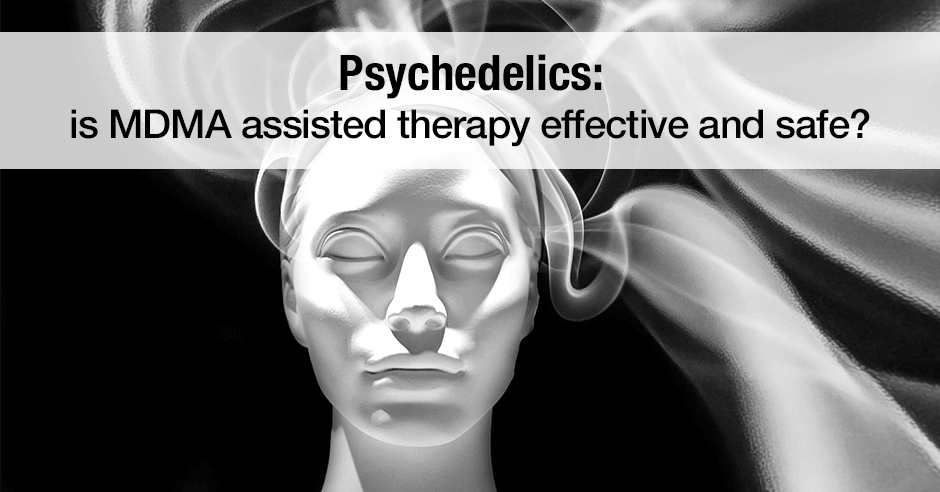
Dr. Dan Engle, MD, did one of the keynote presentations at the recent IMMH conference. The topic was “Psychiatry Meets Psychedelics: Treating Psycho-Emotional Conditions with Ayahuasca, Psilocybin and more.”
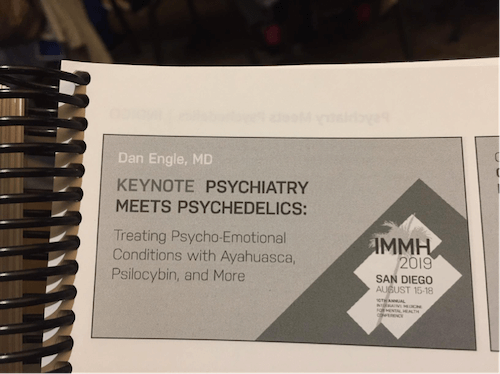
This was not about recreational use of psychedelics but rather Psychedelic Assisted Psychotherapy or PAP, which is “professionally supervised use of ketamine, MDMA, psilocybin, LSD and ibogaine as part of elaborated psychotherapy programs.” Dr. Engle also talked about peyote, cannabis, ayahuasca, San Pedro and DMT.
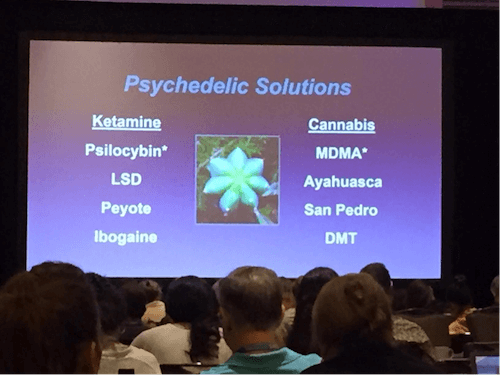
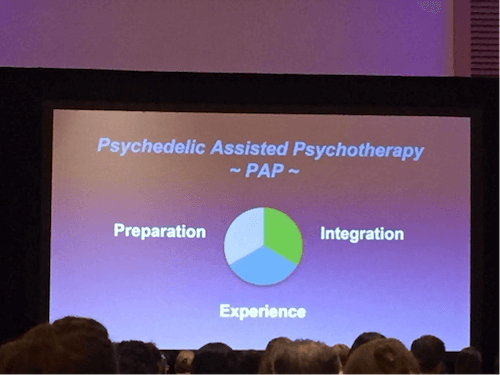
I had the pleasure of meeting Dr. Engle the day before during the speaker panel we were both part of and shared that I was coming to his presentation because I have a curious mind and love to learn but to be honest “I’m not yet sure if I’m on board with pyschedelics because I’m concerned about the adverse effects AND that too many folks will rush into this approach before exhausting all other nutritional and functional medicine options.” He appreciated my honesty, saying the fact that I was going to come to his talk was a great first step.
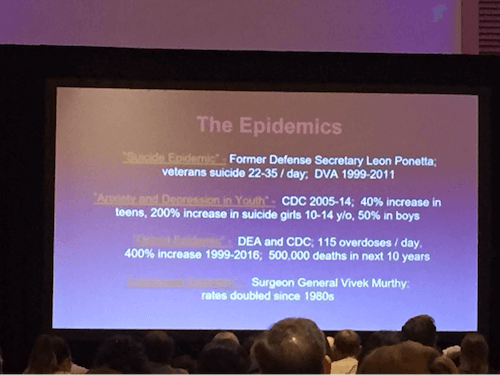
He highlighted the epidemics of suicide (22-23/day in veterans), anxiety and depression in youth (40% increase in teens and 200% increase in suicide in girls 10-14 years old, and a 50% increase in boys, opioids (115 overdoses/day and a 400% increase from 1999-206) and loneliness (where rates have doubled since the 1980s).
This is all very horrifying and calls for drastic interventions. Is Psychedelic Assisted Psychotherapy the solution and is it safe and effective?
Let’s take MDMA as one example. In case you’re new to the term, MDMA is the abbreviation for 3,4-Methylenedioxymethamphetamine. This 2018 article, Is psychiatry ready for medical MDMA? shares this:
Advocates for MDMA-assisted psychotherapy have been at pains to distinguish the street drug ecstasy from MDMA, the medicine. Ecstasy can contain a range of substances as well as varying doses of MDMA.
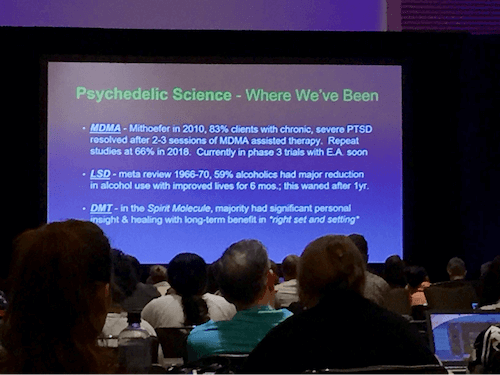
Dr. Engle shared some of the psychedelic science, with impressive results for MDMA.
The study by Mithoefer in 2010 reported that 83% of patients with severe treatment-resistant PTSD saw their symptoms resolve after 2-3 sessions of MDMA assisted therapy. These are very encouraging results, however the patients were described as having treatment-resistant PTSD as a result of not seeing resolution of their symptoms with either psychotherapy or psychopharmacology (i.e. medications). They had not been offered a functional medicine/nutritional approach. This is all good and well if there were no adverse reactions with the MDMA assisted therapy.
According to the above paper: There were no drug-related serious adverse events, adverse neurocognitive effects or clinically significant blood pressure increases.
However, what wasn’t mentioned in Dr. Engle’s presentation is that some studies do show adverse effects of MDMA. For me, this is an area of concern as far as psychedelic use goes, and I would have liked to hear more about what kinds of problems we need to be aware of.
This 2014 paper: The potential dangers of using MDMA for psychotherapy lists a number of very concerning potential dangers:
- Early studies from the 1980s noted that MDMA was an entactogen, engendering feelings of love and warmth. However, negative experiences can also occur with MDMA since it is not selective in the thoughts or emotions it releases. This unpredictability in the psychological material released is similar to another serotonergic drug, LSD.
- Acute MDMA has powerful neurohormonal effects, increasing cortisol, oxytocin, testosterone, and other hormone levels. The release of oxytocin may facilitate psychotherapy, whereas cortisol may increase stress and be counterproductive.
- MDMA administration is followed by a period of neurochemical recovery, when low serotonin levels are often accompanied by lethargy and depression.
- MDMA could increase the likelihood of suicide in those individuals with strong post-recovery feelings of depression.
- Regular usage can also lead to serotonergic neurotoxicity, memory problems, and other psychobiological problems.
- Proponents of MDMA-assisted therapy state that it should only be used for reactive disorders (such as PTSD) since it can exacerbate distress in those with a prior psychiatric history.
The author ends by saying: My own position is that it will always be far safer to undertake psychotherapy without using co-drugs. In selected cases MDMA might provide an initial boost, but it also has far too many potentially damaging effects for safe general usage.
There are many practitioners who, like me, are not yet on board with Psychedelic Assisted Psychotherapy, because adverse effects appear to be under-reported and not discussed. A more recent 2018 paper calls for more research about the safety of MDMA assisted therapy: an immediate need for more research directly examining its safe usage in the therapeutic context.
Hopefully the phase 3 MDMA trial Dr. Engle mentioned on this slide will provide further insights about potential safety issues.
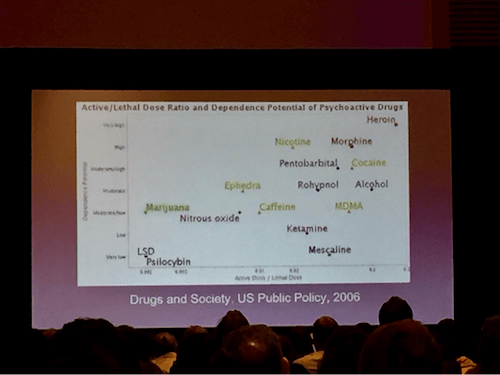
Dr. Engle did also share this interesting slide: Active/Lethal Dose Ratio and Dependence Potential of Psychoactive Drugs, Drugs and Society, US Public Policy, 2006. It’s apparently from this paper published by Gable, RS (I’ll confirm once I find out). You can see MDMA on the far right indicating a rather high potential for acute lethality (bottom scale), with a moderate/low risk for dependence (the scale on the left).
Dr. Engle stopped by my booth after his presentation to see if he’d been able to change my mind. I shared my concerns about the potential risks. I also said that it would be helpful to see a study comparing MDMA assisted therapy with a functional medicine/nutritional approach. I also said I’ll keep reading and learning and will keep an open mind but right now I’m still very much on the fence. This approach does seem to be very effective but I have concerns about safety.
I blogged about some of my concerns last year: MDMA-Assisted Psychotherapy for Treating Chronic PTSD: Why I feel we can do better and the role of nutrition and amino acids like GABA
I agree there is an immense need for successful treatment approaches, but jumping to MDMA from psychotherapy and/or psychiatric medications is skipping out the entire nutritional and biochemical step which is SO powerful and doesn’t have the above adverse effects. I’m concerned too many who have not seen benefits from therapy or medications are seeing MDMA as THE solution and are going to be harmed even further.
One other big reason is that I’m very much on the fence is that I see so much success with the nutritional approach that I use with clients.
In addition to psychotherapy, there are also so many nutritional and biochemical factors we can consider when it comes to PTSD. These don’t have any of the above harmful effects seen with MDMA.
Here are a few to consider:
- In this blog post, PTSD from 3 tours in Afghanistan: Can GABA help with the anxiety? how low GABA can lead to physical anxiety, muscle tension and the need to self-medicate with alcohol or sugary foods in order to calm down and relax. We also have research supporting the use of GABA for helping with unwanted obtrusive thoughts which are common with PTSD. When low GABA is suspected we do an amino acid trial with GABA, one of the calming amino acids.
- A 2016 reports that blueberries boost serotonin and may help with PTSD and anxiety. This was an animal study where the traumatized rats were fed a blueberry-enriched diet. The study authors report an increase in serotonin levels, suggesting that “non-pharmacological approaches might modulate neurotransmitters in PTSD.”
- A recent meta-analysis, Association between posttraumatic stress disorder and lack of exercise, poor diet, obesity, and co-occuring smoking, confirms the diet and lifestyle connection to being more impacted by trauma when health is not optimal.
- Depression, hostility, anger, and aggression and common in returning veterans with PTSD. These are classic signs of low serotonin and a trial of tryptophan may be warranted given that insomnia and anxiety are so common too.
I feel it is these kinds of interventions that should be considered for PTSD, rather than subjecting individuals who are already suffering to treatments that have adverse reactions AND are not addressing underlying nutritional deficiencies of low GABA, low serotonin, out of balance endocannabinoid system, dysbiosis and overall health, to name a few of the many possible underlying biochemical factors.
Real whole food, exercise, GABA, tryptophan, zinc, berries, probiotics etc. wouldn’t even feature on a chart such as the one above! They are effective approaches and they are safe!
In case you missed the previous IMMH blogs:
- Last week I shared some highlights on mold, oxalates, anxiety, panic attacks and depersonalization
- Here are a few highlights from my IMMH presentation: “GABA for Anxiety, Insomnia, ADHD, Autism and Addictions: Research and Practical Applications” – benzodiazepines are not the solution, some new 2019 research on the far-reaching benefits of GABA, and the role of GABA in ADHD.
- A few weeks before IMMH I wrote this blog post on one of the new studies in my presentation: how a combination of GABA and theanine improves sleep and reduces anxiety.
Have you been part of a Psychedelic Assisted Psychotherapy program with MDMA or one of the other psychedelics? What benefits did you experience? Did you have any adverse effects?
Would you consider Psychedelic Assisted Psychotherapy with MDMA or one of the other psychedelics?
Have you see benefits and/or adverse effects with your patients or clients?
As a practitioner, do you want to learn more about how to incorporate GABA and the other targeted individual amino acids, tryptophan/5-HTP, DPA, glutamine and tyrosine, into your work to help your clients/patients with anxiety and PTSD? I invite you to check out my new online practitioner training here: Balancing Neurotransmitters – The Fundamentals. I’m extending the $100 discount offered at IMMH for a few weeks (use coupon code immh2019).
I’m a licensed counselor who often recommends amino acid supplements and GABA to balance biochemistry and manage symptoms of anxiety, depression and PTSD. For more difficult cases I refer to functional medicine practitioners. However, as good as this is, it does not get to underlying symptoms of trauma. For this, deep healing work is needed. I am therefore very impressed with the research so far on MDMA therapy as a healing method for PTSD, which seems to indicate that deep healing can occur in 1 to 3 sessions with few if any side effects. And yes, a low serotonin depression can occur for a day or two after a session, but many people who use MDMA are familiar with using 5htp or tryptophan to help with this.
There doesn’t appear to be any other trauma therapy which has this level of effectiveness, although Emotional Freedom Technique (also known as “tapping”) and other “Energy Psychology” methods (which I use in my practice) come close. I don’t believe that we have to make either/or choices on this. It’s possible to use the best of all of it including MDMA therapy (when it becomes legal, which it may soon following phase 3 trials), energy psychology, natural supplements and functional medicine. And some approaches may work better with some people more than others.
But in terms of PTSD, I believe that there is more than biochemical brain imbalances going on. There are traumatic memories that need to be healed and there needs to be therapies, including MDMA therapy, which can do this. In my clinical experience, there is also trauma underlying much of Generalized Anxiety and Depression as well.
Hi Steven
Great to hear you often recommend the amino acids and refer to functional medicine practitioners.
I hear you on the deep trauma aspect but if this is what Psychedelic Assisted Therapy is really good for (which the preliminary evidence appears to support) then I’d like to see it described in this way rather than “treatment-resistant depression” or “treatment-resistant PTSD” which, as you know, essentially means depression or PTSD that did not respond to medication or therapy. We do really need functional medicine/nutritional approaches to be in the mix of discussions and research because we know when someone is nutritionally stable they are more resilient to trauma and heal more quickly from trauma.
You say “deep healing can occur in 1 to 3 sessions with few if any side effects.” I’m glad you mention that “many people who use MDMA are familiar with using 5htp or tryptophan to help” with the deep depression. But I am also concerned about the other side-effects I list in the blog – some of them very severe. And that fact that these are seldom mentioned in newer studies or in a presentation like this one delivered by Dr. Engle. Folks need to be able go into treatment like this being fully informed and practitioners need to be aware of all this.
Are you familiar with Robert Naviaux’s work on cell danger response/CDR (https://www.everywomanover29.com/blog/low-dose-suramin-autism-disables-cell-danger-response-speech-calm-focus-play/). Your comments are making me wonder if Psychedelic Assisted Therapy is a kind of reboot like the suramin was? Unfortunately suramin is not a viable solution because of the side-effects but I see it was a way for us to understand some of what may be going on and how to try and facilitate healing. I can’t help but wonder if MDMA therapy falls into the same bucket.
I’m intrigued that you feel EFT/tapping comes close to MDMA therapy and excited about this especially since it has none of the side effects (as far as I’m aware) listed in this blog. I’m also intrigued about other “Energy Psychology” methods which you use in my practice and would love to learn more and if they have any side-effects?
I’m all for using everything at our disposal for helping our clients and I’m keeping an open mind about MDMA therapy but I feel we have a ways to go.
I’m also concerned folks will use medications/therapy and not get results and go straight to Psychedelic Assisted Therapy and skip functional medicine/nutrition/lifestyle approaches because the former are all part of the mainstream medical model. I’d like to see everyone start with functional medicine/nutrition/lifestyle and therapy.
Thanks for contributing to the discussion!
The older studies of MDMA which showed neurotoxicity have been largely discredited by more recent research. There was previously a body of false research by a researcher (Ricaurte) funded by the National Institute of Drug Abuse (in the U.S.) who was falsely using methamphetamine in his research on rodents to prove brain damage. This research has now been discredited and he was forced to retract it.
MDMA is therapeutic, not because it creates long-term biochemical changes, but because it calms the amygdala, the alarm center in the brain that constantly triggers fight or flight responses in folks with PTSD. It doesn’t generally cause a disturbing flood of feelings and visions, such as experienced with stronger psychedelics like LSD. It’s not a drug that patients need to keep taking, like an antidepressant. It’s only used for a few sessions of trauma processing. The person generally feels a calm, peaceful and empathic state in which they feel a great deal of self-love and acceptance. In this state the trauma can be calmly and lovingly processed without going into fight or flight reactions which short-circuit the therapy. If a difficult or overwhelming memory does emerge, then there is a team of therapists present to help them process and keep them safe. Even then, the medicine usually keeps them calm and relaxed enough to process.
If taken in this type of safe environment, there are hardly any problems and no long terms side effects. There may be slight low serotonin depression for a couple of days afterwards, which can be helped with 5-htp or tryptophan, but folks don’t go into major suicidal depressions following MDMA therapy.
Abuse of this drug outside of therapy (especially at high dosages) may be another story, but in therapeutic use, the patient is closely monitored and I haven’t heard of any long term problems.
The energy psychology methods that I mentioned are another way to keep the amygdala calm during trauma processing. These methods use tapping or holding Chinese meridian or chakra points while thinking about the trauma. (EFT is the most common and famous one). It is my belief that all successful trauma therapies are ways to keep the amygdala calm during trauma processing. If I could legally do so, I would use all of these methods in combination.
I love the thought provoking comments.
I suffer from a hyper reactive limbic/nervous system due to a number of ongoing traumatic incidents starting at birth – physical, chemical and emotional. I agree that a combination of methods would be the best form of treatment in my case. I have tried a limbic system retraining program (DNRS) and am currently working w a naturopath to restore my GABA and glutamate pathways, as well as neurotransmitters (using most of the amino acids that you do, Trudy). I have worked on my nutrition for 3 years now, and continue to maintain a healthy diet. However, something is still missing from this equation and that is focused trauma work. I am going to start seeing a counselor highly skilled in EMDR which I hope will help.
I have used MDMA myself recreationally in the past. Every time I used it, I wished with all of my heart that it were legal in a therapeutic sense (as I had read on the internet that it once was) bc that is exactly what I got out of it. It allowed me to actually open up to layers of trauma buried deep within and to still love myself and be able to cope with the emotions that arose while doing so.
I over used MDMA in my youth because of this ability it gave me to release trauma. In most cases however it was misguided as the person I was talking to was not skilled in trauma work, and often was not even someone I knew well. I kept trying it in hopes that I would be able to finally feel okay. This unfortunately was abuse and it definitely had side effects. Trudy, I did suffer from serious issues with low serotonin however I believe that is due to my own over use of MDMA as a street drug. I agree that with proper oversight that the serotonin lows could be managed via Tryptophan/5htp, etc. I don’t think the lows would be nearly as bad as the lows I experienced by my own misuse. If this had been available in a legal, therapeutic setting back then, I don’t think I would have continued to use it outside of that setting. My biggest attraction to it was the ability to release trauma. I did not like that it wasn’t safe, but at the time it seemed better to take it like that than to not release at all.
I would love to see therapeutic MDMA offered in cases like mine. I believe it could be a key piece to a very tricky puzzle. I have had a very difficult time opening up in therapy despite having gone to numerous counselors for over 2 decades throughout my lifetime (I am 36). I am hopeful that EMDR will help, but I question if the problem of actually being able to open up to some of the deepest rooted traumas will be a block to the therapy.
I hope research into this therapeutic toolbox continues. The fact that it can so quickly treat trauma is miraculous for those who have constantly sought healing. The impact that these stressors resulting from unresolved trauma have on our bodies and minds are keeping us sick (I’ve been chronically ill since I was 23). It is my hope that research into trauma informed counseling and medicine will continue to expand no matter what the form. Sometimes it takes a combination of things depending upon the patient. There is not always a single treatment that works for us all. I believe in all of these modalities, and agree with you Trudy that the other more natural aspects should not be overlooked, and are a great first step. However, things like MDMA therapy may be a vital component to many people who are suffering.
Jaime
We’re on the same page …”There is not always a single treatment that works for us all. I believe in all of these modalities, and agree with you Trudy that the other more natural aspects should not be overlooked, and are a great first step”
I hope you find the solutions you are seeking. EMDR is very powerful and a modality I should have mentioned in the blog. I’d like to see more folks use this approach before MDMA assisted therapy.
I’m curious if you’ve used EFT/tapping? Steven Fenwick, a licensed counselor, commented above saying he feels it comes close to MDMA assisted therapy in terms of effectiveness.